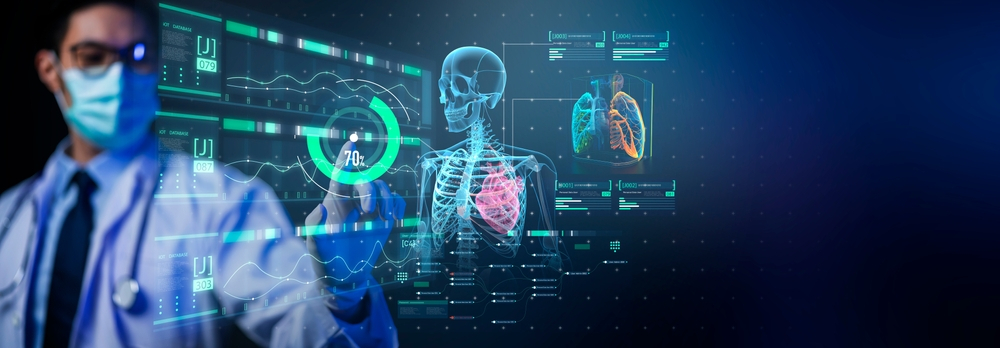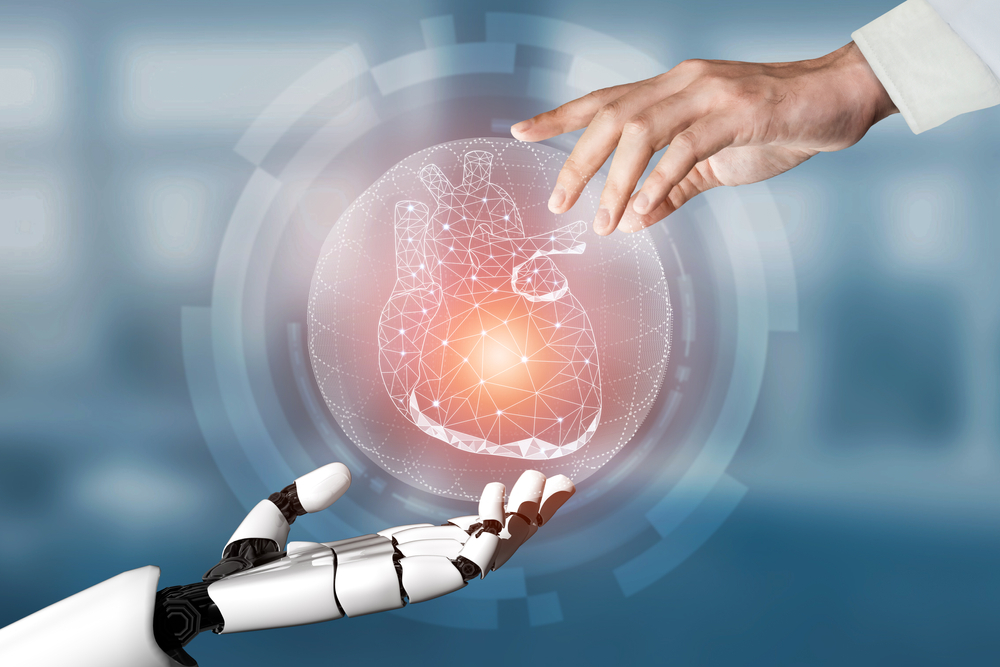Did you know that by 2025, the AI healthcare market is projected to exceed $45 billion globally, reflecting its crucial role in transforming medical care? This staggering statistic underscores the rapid pace at which artificial intelligence is being integrated into the healthcare sector, shaping the future of medicine and patient care.
The adoption of AI technologies in healthcare is not just widespread; it’s fundamentally altering how medical professionals engage with patients, diagnose conditions, and manage healthcare operations. From robotic-assisted surgeries to virtual nursing assistants, AI is making its mark across all facets of the field.
In this blog, we’ll delve deep into some of the most striking examples of artificial intelligence in healthcare examples. Our goal is to highlight how these technologies are not merely adjunct tools but central elements in revolutionizing diagnostics, treatment protocols, patient management, and much more. By exploring these examples of artificial intelligence in healthcare examples, we aim to provide you with a clearer understanding of AI’s transformative impact and what it means for the future of healthcare. Join us as we uncover how cutting-edge AI applications are setting new standards in medical innovation and care.

Diagnostic Innovations with AI in Healthcare
AI in Imaging and Diagnostics
Imagine using a highly sophisticated camera that can not only take sharp pictures in various lighting conditions but also identify what’s in them. Similarly, AI technologies, particularly deep learning, analyze medical images with exceptional detail to pinpoint abnormalities such as fractures or tumors—much faster and often more accurately than the human eye.
In radiology, examples of artificial intelligence in healthcare examples include systems that automatically detect and classify potential issues in X-rays or MRI scans, alerting physicians to areas needing attention.
Wearable AI Technologies
Think of a fitness tracker you might wear on your wrist that measures your steps and heart rate. Imagine if that device could also predict when you might get sick. That’s the level of sophistication that AI-powered wearable devices bring to healthcare.
- Overview: These devices continuously monitor health metrics like heart rate, blood sugar levels, and even oxygen saturation, providing real-time data.
- Impact: By offering immediate health insights, these artificial intelligence in healthcare examples empower both patients and doctors to make informed decisions quickly, potentially preventing severe health episodes before they occur.
By incorporating these AI-driven technologies, you’re not just keeping up with current trends; you’re staying ahead, leveraging cutting-edge tools to enhance diagnostic accuracy and patient care.
Treatment and Management Enhanced by AI in Healthcare
AI in Surgery
Imagine if a highly skilled surgeon had a tool that could extend their capabilities, making precise movements smaller than any human hand could manage. That’s what robotic surgery systems do—they act as extensions of the surgeon’s hands, but with greater precision and steadiness.
Key Benefits:
- Precision: These systems can perform intricate surgeries with minute precision, significantly reducing the risk of complications.
- Faster Recovery: Due to smaller incisions, patients often experience less pain and quicker recovery times compared to traditional surgery.
Many patients undergoing robotic surgeries have reported faster healing, less pain, and shorter hospital stays, which underscores the effectiveness of these artificial intelligence in healthcare examples in improving outcomes.
AI in Treatment Planning
Consider how a weather app analyzes vast amounts of data to personalize the weather forecast for your exact location. Similarly, AI in treatment planning uses data from a patient’s medical history, genetic information, and ongoing health data to develop tailored treatment plans.
Application:
- Personalized Medicine: AI analyzes health data to recommend the best possible treatment options tailored to individual patient needs.
- Example in Oncology: In cancer care, AI systems assess a patient’s genetic profile to predict which treatments are most likely to be effective, minimizing the trial-and-error approach often associated with cancer treatment.
By exploring these examples of artificial intelligence in healthcare examples, you can see how AI not only supports the work of medical professionals but also significantly improves patient care outcomes. Whether it’s through enhancing surgical precision or personalizing treatment plans, AI is making a profound impact in the healthcare sector.

Efficiency and Administration Enhanced by AI in Healthcare
AI-Driven Hospital Operations
Think of AI in hospital settings as a highly efficient traffic control system that manages the flow of cars during rush hour, ensuring everything moves smoothly and quickly. Similarly, AI optimizes hospital workflows, staffing, and resource allocation, which is critical for operational efficiency.
Key Benefits:
- Streamlined Workflows: AI tools analyze real-time data to manage hospital schedules, staff allocations, and patient flow, much like a smart traffic system adjusts signals to reduce congestion.
- Impact: Hospitals using AI have seen reduced wait times for patients, more balanced workloads for staff, and overall cost savings due to more efficient resource use.
Several hospitals have implemented AI systems that predict patient admission rates, which helps in preemptively managing staffing needs and bed allocations.
AI in Medical Coding and Billing with CODIO
Integration with Billing Software
Just as smart home devices integrate seamlessly to automate and improve home management, MediCodio’s CODIO app integrates with existing billing software to automate and enhance medical coding and billing processes.
Benefits:
- Increased Accuracy: CODIO reduces human error in coding by using AI to ensure that the latest medical codes are accurately applied, much like a smart thermostat automatically adjusts to save energy.
- Faster Processing Times: Automated systems speed up the billing cycle, allowing for quicker claim processing and reduced turnaround times.
- Reduced Administrative Workload: Automating routine tasks frees up staff to focus on more critical responsibilities, enhancing productivity.
- Improved Financial Health: Enhanced efficiency and accuracy lead to better revenue cycle management, improving the financial stability of healthcare providers.
Healthcare practices that have integrated CODIO report significant decreases in billing errors and improvements in the speed of reimbursements, much like how businesses using automated inventory systems see reductions in stock discrepancies and losses.
By adopting these artificial intelligence in healthcare examples, you can see how AI not only optimizes hospital operations but also revolutionizes medical coding and billing processes. These technologies ensure that healthcare providers can focus more on patient care and less on administrative tasks, driving significant improvements in both operational efficiency and financial outcomes.
Patient Engagement and Monitoring with AI in Healthcare
Virtual Health Assistants
Imagine having a highly knowledgeable assistant available 24/7 to answer any questions about your health, much like a customer service chatbot that can help you track your online orders or answer your banking queries instantly.
Role of AI Chatbots
- Immediate Interaction: AI chatbots in healthcare function similarly, providing immediate responses to patient inquiries about symptoms, medication schedules, or upcoming appointments.
- Continuous Support: These virtual assistants are available around the clock, ensuring patients always have access to information and support, enhancing their engagement and satisfaction with healthcare services.
Benefits
- Enhanced Engagement: By offering real-time interaction, these chatbots keep patients actively involved in their healthcare processes.
- Accessibility: Patients can receive consistent support right from their homes, making healthcare more accessible and less intimidating.
Predictive Healthcare
Think of predictive AI as a weather forecasting system that analyzes patterns to predict a storm before it arrives, allowing people to prepare in advance. Similarly, AI in healthcare analyzes medical data to predict health events before they manifest.
How AI Predicts Health Incidents
- Data Analysis: AI systems integrate and analyze vast amounts of health data, such as heart rate or blood pressure readings, to identify potential health risks.
- Predictive Alerts: For example, AI can analyze heart monitoring data to predict the likelihood of cardiac events, enabling preventative measures to be taken before an emergency occurs.
Benefits
- Proactive Care: This early warning system allows healthcare providers to intervene earlier, potentially saving lives by preventing severe health incidents.
These artificial intelligence in healthcare examples illustrate how AI is not just a technological upgrade but a transformative tool that enhances how patients engage with their healthcare providers and how providers monitor and respond to patient needs. By leveraging AI, healthcare becomes more intuitive, proactive, and supportive, significantly improving the quality of care delivered.
Ethical Considerations and Future Outlook of AI in Healthcare
Ethical Challenges
- Privacy Concerns: Ensuring the confidentiality and security of patient data is paramount, as AI systems require extensive data to function effectively.
- Decision-Making Autonomy: AI must support, rather than replace, human decision-making in healthcare, ensuring that providers retain ultimate control over clinical decisions.
Future Trends
- Greater Integration: AI is expected to become more embedded in daily healthcare practices, enhancing diagnostics and patient monitoring with increasing sophistication.
- Enhanced Personalization: Future AI will likely focus on personalizing treatment plans more precisely based on individual patient data, improving outcomes and efficiency.
- Ethical AI Development: The development of AI will continue to emphasize ethical considerations, aiming for transparency and fairness in AI applications within healthcare.
This streamlined overview addresses the essential ethical concerns and anticipated advancements of AI in healthcare, focusing on maintaining core medical values while embracing technological progress.
The bottom line is that you should stay ahead in the rapidly evolving world of healthcare by keeping informed about the latest advancements in AI. Understanding these innovations will not only enhance your medical practice but also improve patient outcomes. Consider the implications of AI on your day-to-day operations and how it can resolve complex challenges efficiently.
To truly harness the power of AI in your healthcare practice, explore integrating MediCodio’s CODIO app. CODIO brings cutting-edge AI technology directly to your billing and coding processes, streamlining operations and boosting accuracy. Learn more about how CODIO can transform your RCM and enhance your service delivery. Visit our website or contact us today to see CODIO in action and take the first step towards a more efficient, informed, and innovative healthcare practice.
FAQ’s
What is AI in healthcare?
AI in healthcare refers to the use of artificial intelligence technologies to improve various aspects of health services, including diagnosis, treatment, billing, and patient care management. AI can analyze large data sets much faster than humans, enhancing decision-making processes and operational efficiency.
How can AI enhance Revenue Cycle Management (RCM)?
AI improves RCM by automating tasks such as medical coding and billing, reducing errors, speeding up claim processing, and enhancing overall financial reporting. This leads to quicker reimbursements, fewer denials, and a more streamlined financial workflow.
What makes MediCodio’s CODIO app different from other medical billing software?
MediCodio’s CODIO app utilizes advanced AI algorithms to automate and improve accuracy in medical coding and billing processes. Unlike traditional software, CODIO continuously learns and adapts, ensuring compliance with the latest healthcare regulations and coding updates.
Can CODIO integrate with existing healthcare systems?
Yes, CODIO is designed to seamlessly integrate with existing healthcare systems and electronic health records (EHRs). This integration facilitates smoother transitions and data synchronization, enhancing workflow efficiency without disrupting existing processes.
What are the benefits of using CODIO for healthcare providers?
Using CODIO can significantly reduce administrative workload, increase coding accuracy, and speed up the billing cycle. These improvements lead to better resource allocation, higher patient satisfaction due to fewer billing errors, and improved financial outcomes for healthcare providers.





